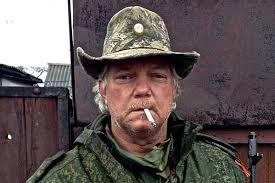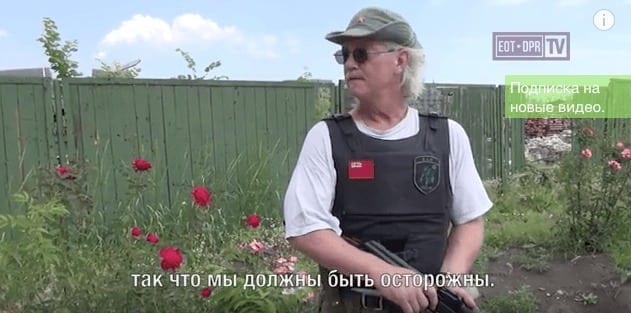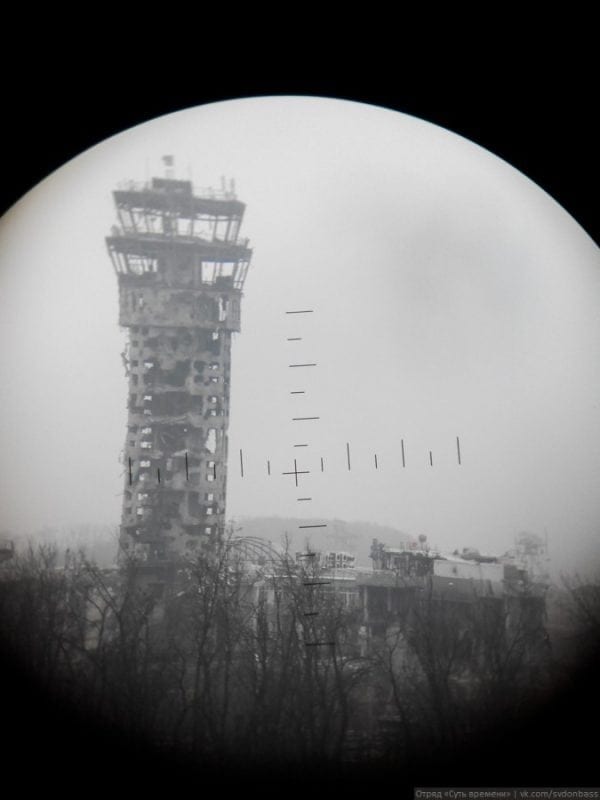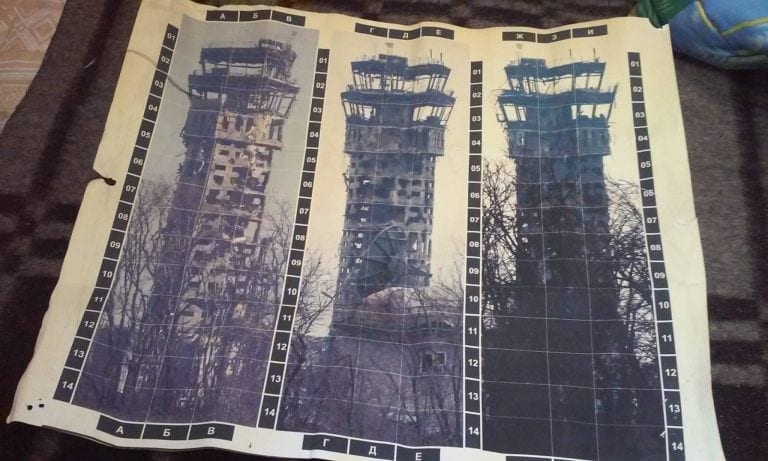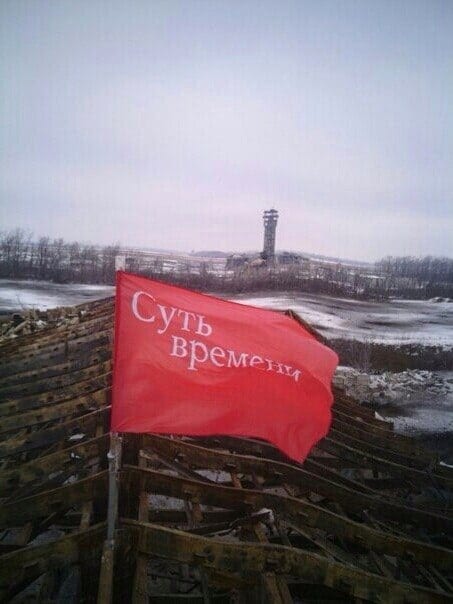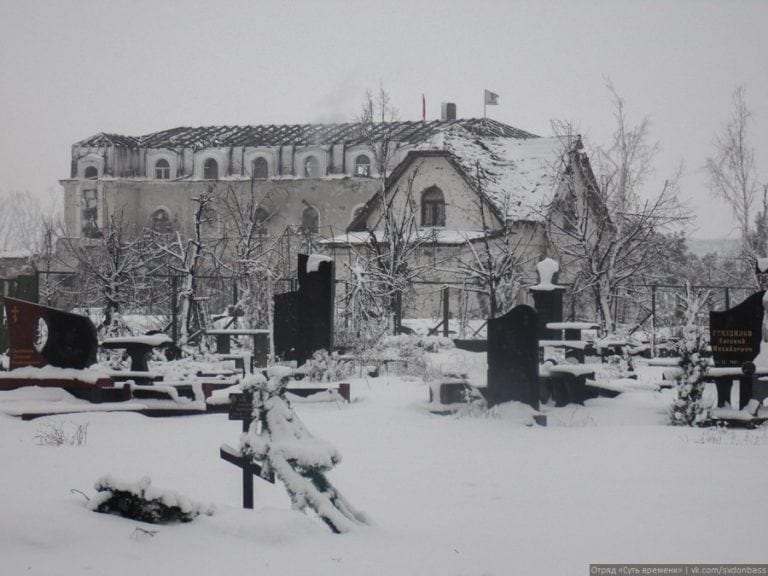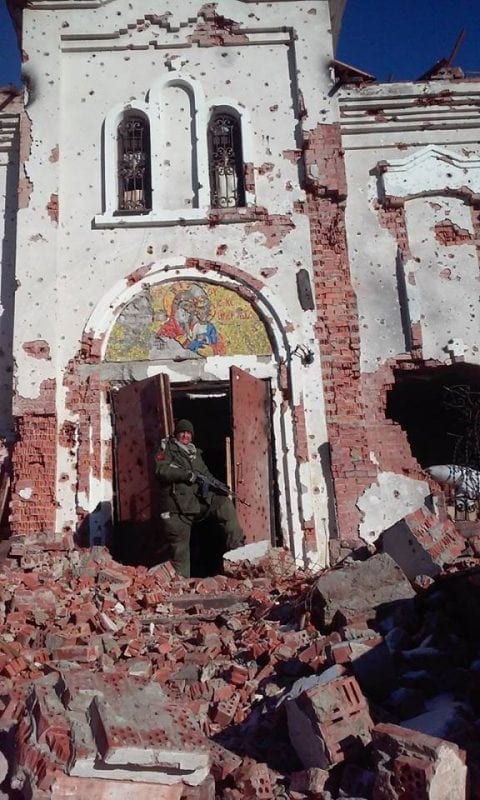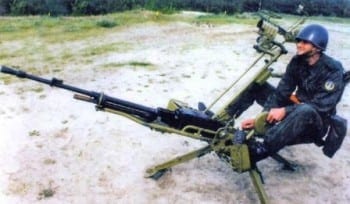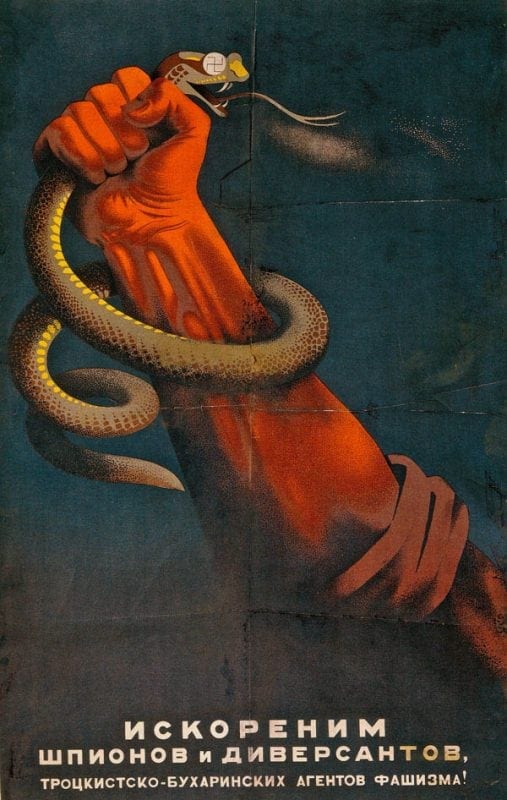= War Diary by Russell “Texac” Bentley =
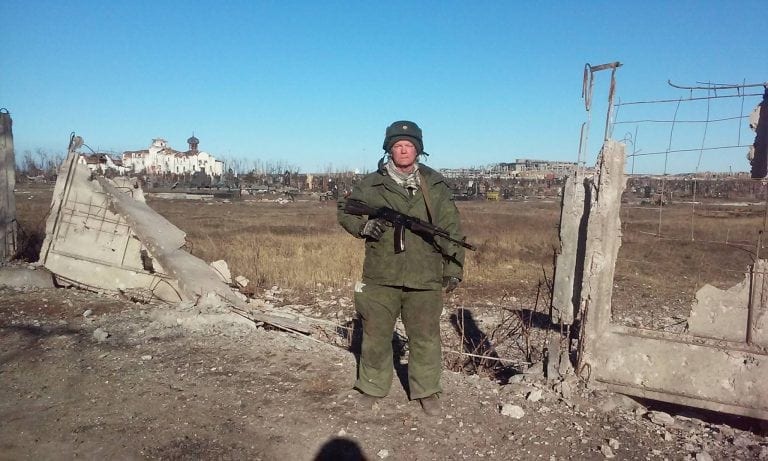
Russell Bentley (Texac) in the troishka area, daily facing eternity. Like many soldiers before him, defending what seems like an unimportant patch of earth. The image was taken several months after the events in this article; the New Terminal is on the right; Troishka on the left. Two CB soldiers were killed in almost the exact spot where Texac is standing, the day after this photo was taken. (Click on image.)
New Year’s Eve, 2014, I left Yasynuvata at 4 o’clock in the morning in the back of a dark blue mini-bus. I had two backpacks full of clothes and gear. I had a good kevlar helmet with a defective chin strap, and I had the best type of body armor that I have ever seen anybody wear in the Novorossiyan Armed Forces — Class 4 steel in a slim black vest. Heavy, about ten kilos, but worth it. In Russian, body armor is called “Bronik-gilette”, or just “Bronik”. Your bronik is your friend…
I also had an AK-74 “Avtomat”, and five loaded magazines — one in the gun and four in the web gear I had bought in Rostov. My sleeping bag, also bought in Rostov, was a 3XL bag rated for the Arctic. It was reasonably priced and turned out to be one of the best investments I have ever made in my life. I learned to love that sleeping bag like a beautiful girlfriend. My Avtomat too, like a girlfriend, even if they weren’t always faithful. Everybody at the front has a name for their rifle. Mine was named “Софи”, “Sophie”, after my youngest niece.
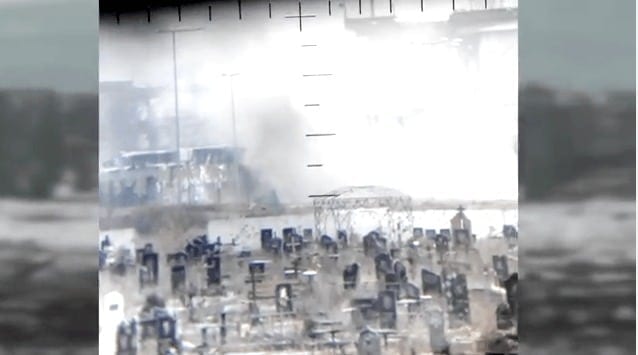
The van had ultra dark tinted windows, but it didn’t really matter because they were frosted up on both sides a quarter of an inch thick. As the saying goes, “you couldn’t see shit.” I was crammed in with half a dozen other soldiers, along with so much stuff — food, water, soup, ammo, clothes, blankets and weapons that we barely had room to breathe. The mood was somber, serious. It reminded me of the US Marshal vans I had ridden in, on my way to prison, back when I was doing my bit. Heading into the unknown, where the only thing known was that it was not going to be pleasant.
[dropcap]I[/dropcap]t took us almost an hour to get to the Airport. 25 km from Yasynuvata to Donetsk, then about 10 km to the Airport. My Russian language skills were so poor, I couldn’t really say anything, and the few comments the other guys made were totally incomprehensible. I had expected Orion to be with me as interpreter, but he was in the hospital with a lung infection. I had the same bad cough, and it was bad, but I’ve never missed a day of work because of being sick, or even hungover, and I wasn’t going to start now. I did not come to Donbass to check into the hospital. Finally, the van came to a stop and the side door slid open. It was dawn on the morning of December 31st, 2014. Still dark, and very, very cold. The driver motioned for me to get out, and I did. I thought we all would, but it was only me and the driver. I looked around…
We were standing in front of what was left of an Eastern Orthodox church that had been heavily, heavily bombed. The roof was blown down, and there was not a square meter of the exterior that did not have several dozen bullet holes or shrapnel scars. 500 meters directly behind the church was the New Terminal, occupied by the “Cyborgs” of the Ukrainian Army. Everything between the church and New Terminal was just an open field. Actually, I looked a little closer and realized it was not an open field, it was a cemetery. A big one, with a couple of thousand graves. It reminded me of the cemetery in the final scene of the movie “The Good, The Bad and The Ugly”. The scene I was in would be the first in this, my own real life movie, but it also might be my last.
I was standing next to a blown up church in the middle of a grave yard, going to war in a strange foreign country that I had been in for less than a month. I realized I could get killed today, any second, starting right now. It felt like I was standing outside of time, but I knew I didn’t really have time to stand outside of time right then. I was “all in” as we say in Texas Hold ‘Em, and now I had to play the hand I had dealt myself.
BELOW: Texac offers a view of the bombed church and explains the events in which the site played a pivotal role.
We unloaded our share of the supplies in front of the church, and as we did, four soldiers approached from the monastery, where the combat position “Troishka” was located. (“Troishka” because the monastery had three stories — or used to have three stories.) They were regular looking guys, except for the fact they all carried machine guns and wore helmets and bulletproof vests, with ammo clips and grenades festooned all over their torsos, and they were very serious. Very serious. Fortunately, our first conversation was easy. The word for “sniper” in Russian is pronounced almost the same as in English, kind of like “shnaypair”. When they pointed towards the New Terminal and control tower and said that word, I knew exactly what they were talking about. I understood.
It took us a few trips to hump all the gear the 100 meters or so from the drop off point in front of the church to the ground floor of Troishka. The ammo first, then the food and water, then my personal gear. Two backpacks. Before I left Yasynavata, I was told I would only be at the airport a day or two. Good thing I packed. You know the old saying about “I spent a week in Moscow one night”? Well, I spent half my life at Troishka in a couple of weeks. Time is relative. Especially when you’re standing outside of it.
What is the Essence of Time movement (CB)? Click the bar below for an insight into its principles.
[learn_more] ESSENCE OF TIME (Russian: Суть времени) is a Russian communist movement,[1] founded and led by political scientist, philosopher and theater director Sergei Kurginyan.[2][3]PRINCIPLES: The movement’s ideology is a mixture of Russian patriotic ideas with communist elements, giving Russia a messianist role on a global scale. Its principles are explained in the manifesto of the movement “Essence of Time”.[1] The manifesto declares that the Dissolution of the Soviet Union was a great tragedy. The objective of the movement is to restitute the USSR in a better and more capable form. The ascertainment of what and who was responsible for the USSR’s fall is considered a key step in this process. According to Kurginyan, capitalism is inherently incompatible with Russian historical and cultural heritage. Since the fall of the USSR in 1991 “capitalism in Russia has not built anything, and destroyed everything”, but, fortunately, after 20 years, Russia is slowly starting to “wake up”. The Fall of the USSR was just a part of a game, played by postmodern entities against “history and humanity”. Kurginyan considers his manifesto to be a new Communist manifesto, [citation needed] analysis of new bourgeoisie, whose nature has evolved since Marx’s time.
[dropcap]T[/dropcap]he movement is grounded in modern philosophy and incorporates the ideas of Karl Marx, Max Weber, Erich Fromm, Antonio Gramsci, Alexander Bogdanov, Viktor Frankl, and others. One of the main principles of the movement’s ideology is the ascription of great importance to the human spirit as a philosophical category, which is considered to be linked directly to the question of the ascent of humanity. The project subscribes to conception of uber-modernity (in Russian сверхмодерн, tr. sverkhmodern), not to be confused with post-modernity, and on this principle hopes to build a new historical project for Russia. The project conceives of a great historical role for Russia in moving the world out of the global crisis of capitalism, based on the country’s experience of alternatives to capitalist modernity and so-called post-modernity. The movement seeks to unite people with socialist and communist political views as well as those with patriotic views and Orthodox Christian values, hoping on this basis to create a spiritual synthesis. One of the main aims of the movement is a revival of the Soviet Union on new principles, taking into account the mistakes of the past (the project is thus dubbed USSR 2.0). EoT envisions a new red union state – a union of equal nations where the Russian nation plays the role of the state’s core. The ultimate goal of the movement is the bringing to life the best of communism’s ideas -namely a state of being in society which provides for the awakening and development of the higher creative abilities of every human being under justice. SOURCE (edited): WIKIPEDIA [/learn_more]
We ran across the hundred yards between the front of the church and the door of the monastery. Every move we made outside was under Ukrop observation and therefore, potentially fatal. So we moved quickly. Once inside the door of the three story monastery, we turned right and went up the stairs, passing a switchback landing with a guard post and an AGS automatic grenade launcher. The door to the second floor was sealed by a sheet of plastic and a heavy rug. Almost completely airtight and light tight. I stepped inside, into almost total darkness, and a thick haze of smoke from the wood burning stoves that were the only source of heat for our quarters and for cooking. Even though the sun had begun to rise outside, the darkness inside was pervasive, due to the fact that all the windows had been sealed with sandbags against the frequent artillery. Only small firing ports were open to the outside. You literally needed a flashlight, even during the day, just to move around. Good thing I had brought three. I was going to need them.
[dropcap]T[/dropcap]he monastery was a rectangular building, with a north-south axis. Directly to our north was the airport control tower, about 400 meters away, behind a treeline and small radar station only about 150 meters away. The New Terminal, or what was left of it, was about 500 meters to our East. Both the control tower and New Terminal were held by Ukrop Army “Cyborgs”, along with Pravy Sektor Nazis and US and EU mercenaries. Within less than a kilometer’s range, the enemy forces arrayed against us outnumbered us about 10 to 1. There were never more that 20 of us at Troishka, and usually closer to a dozen. Against at least 200 Nazis and Ukrop soldiers. Long odds, but somewhat better than the odds at The Alamo or Thermopylae. Still, we would get plenty of chances to die like heroes here, and some of us would.
Our main positions were on the second floor. The building had originally been three stories, but the roof had been completely bombed and burned off, so the floor of the third floor was now the roof. Needless to say, it leaked. The layout of the second floor was a long narrow hallway with six rooms on each side. The ones on the right were all firing positions facing towards the New Terminal, and our food storage room. The rooms on the left were, from back to front, commander’s room, eight-man room, kitchen, two eight-man rooms and the ammo room, located just behind the forward firing points facing the control tower. There were three firing points; the main one at the end of the hall was for the “Uchos”, a 12.7 mm heavy machine gun, comparable to the US M2 .50 caliber. To the left of the Uchos was a window for observation and for the PKM when there was something to shoot at. To the right was a small room that had firing ports cut through the walls to the north and east. This small room was destined to become my office, and I would do a lot of work there.
After a quick tour of the position, I was taken to the room where I would be sleeping. There were eight bunks, and four guys — Arik, sniper, who never said much, Bielka (“Squirrel”) a local veteran of over six months of fighting, and two Italian volunteers, “Spartak” and “Archangel”. I was placed with the Italians, because I speak rudimentary and imperfect Spanish, and it was considered that Italian was similar enough to Spanish that I could communicate with them. Well, almost At that time, my Russian was so limited as to be of virtually no use at all, and my Italian skills were hardly better. I was going to be operating with sign language and on the basis of “vibes”. Good luck and pass the ammo…
[dropcap]A[/dropcap]s dawn turned into day, the dull light of grey overcast snow clouds filtered through the few small openings, but the temperature remained below zero. It was very fuckin’ cold. Each bunkroom had a small metal wood burning stove for warmth, and candles provided the light, along with the ever present flashlights that most wore on their heads or around their necks at all times. After weapon and body armor, a flashlight was one of the most vital items for work and survival. The stoves were very important too, but there were two problems with the stoves —first a severe lack of firewood, and second, the smoke. All the stoves were on the same side of the building, facing west. And there was a western wind, strong and cold, blowing most of the time. Blowing the smoke right back down the chimneys. It was smokier than the smokiest smoke-filled barroom you have ever been in, by a factor of ten. I am sure firefighters are the only ones who have been in smokier conditions than we had there. The smoke would drive you crazy, make you want to cry, but you kept the fire going, because it was either that or freeze. All day, every day, 24/7. Of all the things I remember about Troishka, the smoke is always what first comes to mind. I already had a real bad cough before I left Yasynavata, and this smoke situation sure did not help.
And speaking of smoke, I had only brought a few packs of cigarettes, having erroneously been told by Orion before he left to the hospital that I would be at the airport for only a day or two. Upon arrival, I was told the rotation would last for at least two weeks, maybe a month. And there was no going to the store from there. But Vostok Battalion understood how important cigarettes are for soldiers in a combat zone (and they really are), and so we had a big pile of cigarette packs, sitting on a corner of the kitchen table, and take all you want. The cigarettes were called “Prima”, in a red cardboard pack. Filterless and strong, along the lines of French Gauloises or Mexican Delicados, both of which I had smoked before. But the interesting thing I noticed about these Primas was written on the top of each pack – “CCCP”. I wasn’t too good at reading Russian then, but I knew what “CCCP” meant. It meant that those cigarettes had been waiting for at least 25 years to be smoked. And now, we smoked them.
[dropcap]L[/dropcap]unch was pig liver paté (“pashtet”) on hard dry crackers. It was served cold, but at least not frozen, and the tea was boiling hot, strong and sweet. Protein, carbs, caffeine and sugar. A soldier’s diet. Dinner was soup and fresh bread. For Novorossiyan soldiers, bread is a delicacy, add mayonnaise or ketchup to just plain bread, and it is a gourmet delicacy. They were right. It went well with the soup, which was twice as good (or half as horrible) as the soup in Yasynuvata. Front line soldiers are either always first, or always last, in line when it comes to supplies. It depends on the Commander. We had a good one, “Volga”, but there wasn’t a lot to go around, and everybody had to get something, so we didn’t get much, even at the front of the line. The food was sometimes quite meager, and always very basic, but there was almost always tea, and sometimes instant coffee. But there were plenty of bullets, and they brought plenty more every day. And we certainly used them.
As the day progressed, the rumble of (not too) distant cannon and gunfire was constant, but was not directed at us. But we knew it was directed at somebody. On a battlefront, you generally don’t shoot unless you see something. But if you see something, you shoot to kill. And there was a lot of shooting going on around us. Shooting to kill. As the short and overcast day began to fade into night, New Year’s Eve, I was told that for the Ukrops to go a whole day without attacking or at least firing on on our position was quite unusual. That was OK by me. I figured I could use at least a couple of hours to get acclimated. Before I started shooting and getting shot at…
![]() At this point in our narrative, a pause to pay homage to departed comrades.
At this point in our narrative, a pause to pay homage to departed comrades.
|
Tribute to fallen at the Donetsk Airport/Памяти наших товарищей, павших в бою за донецкий аэропорт https://youtu.be/gxvxt6cXN2M
|
If you have a heart, and some knowledge of the conflict in Ukraine, while watching this homage it will be difficult to hold back the tears. These young men died because the enormous forces of US imperialism, cloaked in ignorance and selfishness, are still free to roam the world plotting, funding, organizing, committing, and triggering appalling crimes with almost total impunity. Let us all honor these real heroes for a better world. They stood for a most honorable cause. They will not be forgotten!
As night fell, what had been the deep blinding darkness of the day became the absolute total darkness of the night, where not a single photon touches the optic nerve. Darkness within darkness. Outside it was a Winter night with low, dark clouds reflecting the almost complete absence of light from the ground. There was no electricity, and to show any light from flashlight or fire was to invite bullets, many and big ones, and that right quickly. So, darkness was the name of the game. Walking down the hallway, you could not see the soldier walking a single meter ahead of you. Not an outline, not any visual indication he was there at all. Only what you could hear and smell, and sense and feel. It was like walking down the hall with my eyes closed, and sometimes I did, and sometimes I could see better that way.
At the end of the hall was a firing port for the “Uchos” , the 12.7 mm heavy machine gun that was our main armament. It sat by the window, which was fully sealed with sandbags except for a small firing port that was usually sealed wih a piece of plywood for light discipline, and only opened when a target had been acquired. About ten feet to the left was our observation post, equipped with a PKM general purpose 7.62 mm machine gun. The PKM was Bielka’s weapon, and not to be fired by anyone else except in emergencies. But it was always there if we needed it. Both the Uchos and PKM firing/observation points faced north looking directly at the Donetsk airport control tower, which was a Ukrainian Army fighting position about 400 meters away. There was also a small radar building and long treeline about 150 meters away, from which the Ukrops would usually launch their attacks. There were always at least two soldiers on guard duty, one at the PKM window, and another on the landing with the AGS guarding the door. The shifts were four hours, and we each pulled two shifts a day. We had a night vision scope for the Uchos, and a handheld thermal imager that was most effective at detecting advancing enemy troops.
[dropcap]T[/dropcap]hermal imagers are among the most important weapons in modern combat. We had one, but it didn’t always work. The Ukrainian Army had plenty of them, thanks to the “non-lethal aid” from the their masters in the USA. Every time I stood at the window on guard duty, I wondered if my thermal signature was in the crosshairs of a Nazi sniper’s thermal scope, made in the good ol’ USA. I would bob and weave at the window, hoping I would move enough between the time the trigger was pulled and the time the bullet arrived. The veterans would just stand there, perfectly still, facing death fearlessly.
I learned to emulate what the veterans did. They would communicate what I needed to know, but would mostly say nothing and see how long it took me to figure things out for myself. It wasn’t that they didn’t care, it was simply that they were soldiers in a combat zone and they had other things to do besides babysit me. I had volunteered to be a soldier, so I was expected to look after myself. It was a steep learning curve, but I did my best, and that was good enough. Good enough to keep me alive.
The control tower was the prominent terrain feature and the focus of our attention. To me, the control tower, which had sustained hundreds of impacts from all types of weapons, looked like a serpent ready to strike, with a crown on its head. The Serpent of Fascism had raised its ugly head in Novorossiya, and we were there to prevent it from advancing any further. Or die trying. I was ready, or as we say in Russian, “Gatov”.
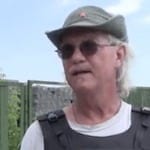 Russell Bentley (Texac) is an advocate and defender of the victims of the Novorossiyan War, and war correspondent for anti-imperialist media outlets, especially for The Greanville Post, the online magazine“New Eastern Outlook”, and a select number of other leading political sites.
Russell Bentley (Texac) is an advocate and defender of the victims of the Novorossiyan War, and war correspondent for anti-imperialist media outlets, especially for The Greanville Post, the online magazine“New Eastern Outlook”, and a select number of other leading political sites.
FIFTH ITERATION REV. 11.15.15 19:11
ADDENDUM
“COME AND SEE” (1985)
Come And See (1985) pt. 1 by karimberdi
Come And See (1985) pt. 2 by karimberdi
Note to Commenters
Due to severe hacking attacks in the recent past that brought our site down for up to 11 days with considerable loss of circulation, we exercise extreme caution in the comments we publish, as the comment box has been one of the main arteries to inject malicious code. Because of that comments may not appear immediately, but rest assured that if you are a legitimate commenter your opinion will be published within 24 hours. If your comment fails to appear, and you wish to reach us directly, send us a mail at: editor@greanvillepost.com
We apologize for this inconvenience.
![]() Nauseated by the
Nauseated by the
vile corporate media?
Had enough of their lies, escapism,
omissions and relentless manipulation?
Send a donation to
The Greanville Post–or
But be sure to support YOUR media.
If you don’t, who will?



